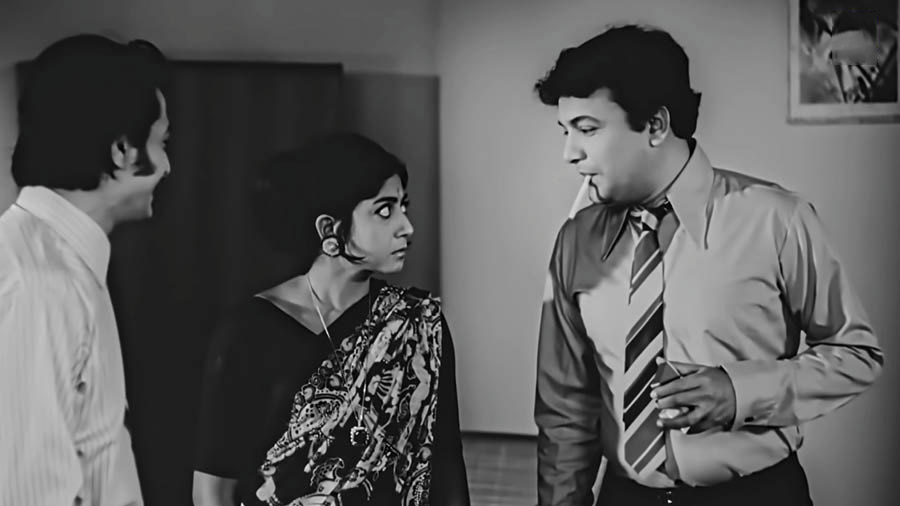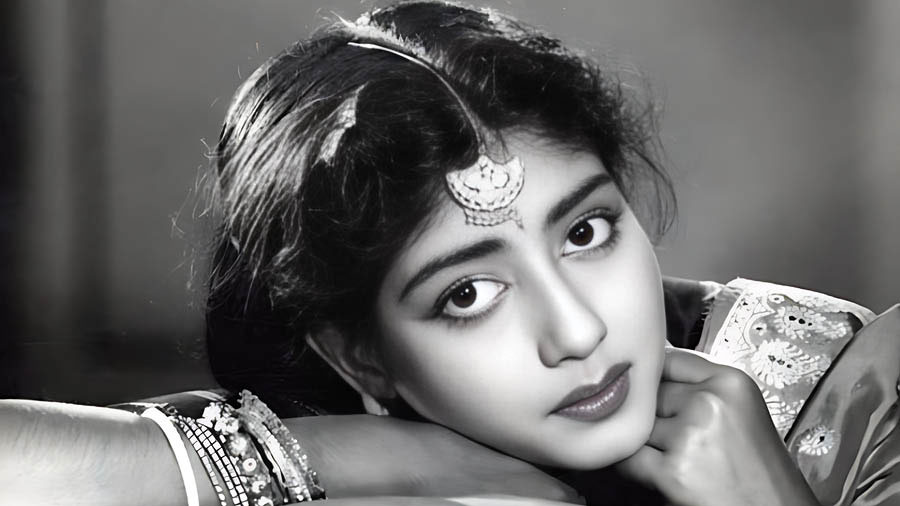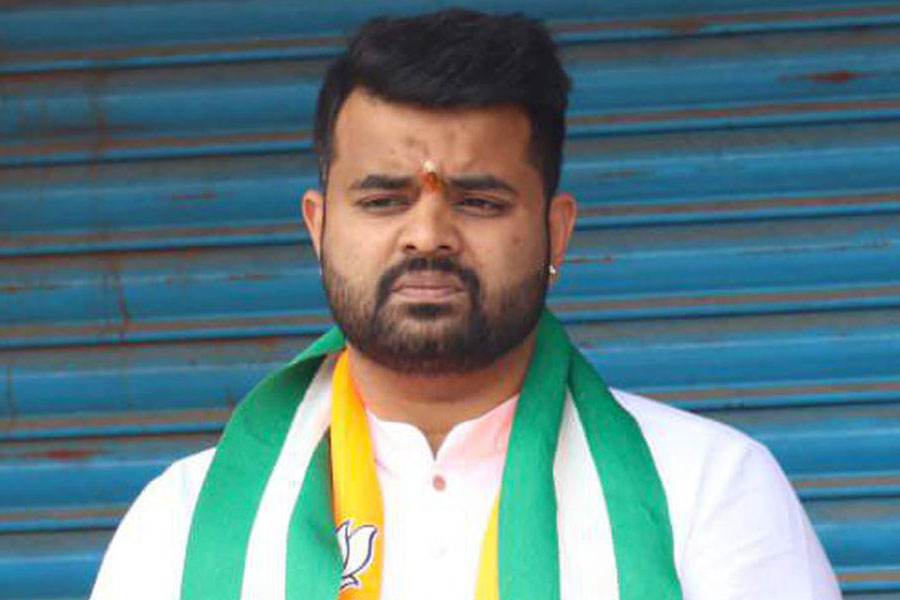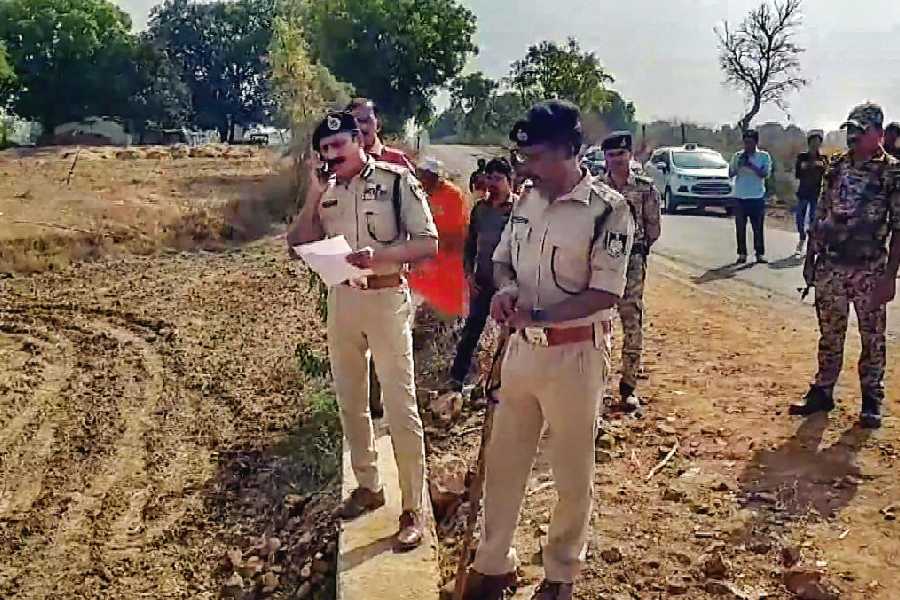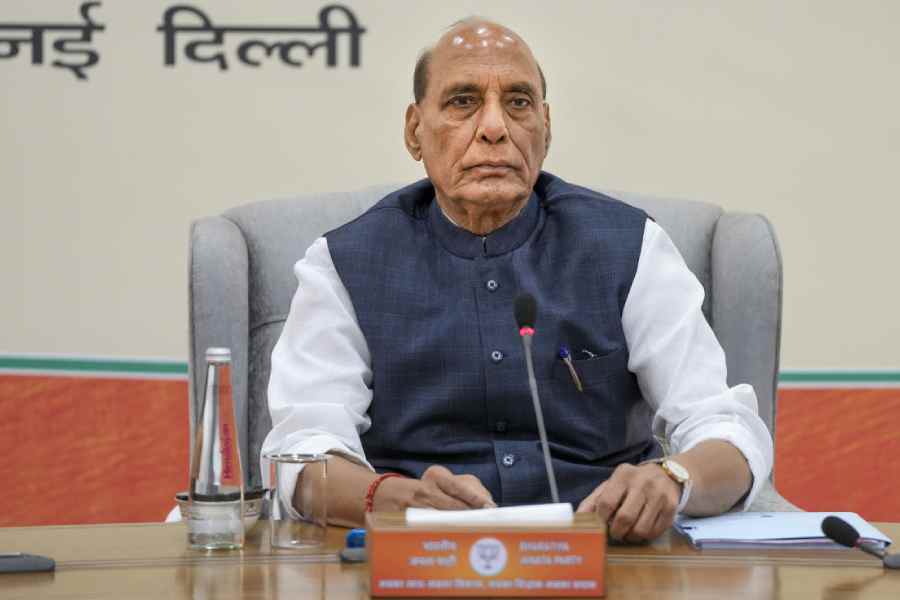(This is the second and last part of an article on legendary Bengali actress Sabitri Chatterjee, who turned 86 last week and has a film career spanning more than six decades)
Marutirtha Hinglaj (1959): The Art of the Subtle Dramatic
Directed by actor Bikash Roy, Marutirtha Hinglaj traces the trials and tribulations of a group of devotees making the arduous pilgrimage to Hinglaj, in the Baluchistan province of Pakistan, one of the 51 Shakti peethas holy to Hindus. Kunti (Sabitri) and Thirumal (Uttam Kumar) play young impoverished lovers on the run after Kunti, who has been abandoned by her husband, elopes with conman astrologer Thirumal. They join the pilgrims after she is raped by bandits in the desert who beat up Thirumal and leave him for dead.
As Kunti convinces herself that they owe their sorry plight to their ‘sinful’ love and takes a vow of asceticism, distancing herself from Thirumal, the latter, driven by his unbridled passion, goes off his mind. Though it is Uttam Kumar who has the meatier part with more dramatic potential, it is Sabitri who anchors the film in her usual understated manner, so that her tormented climactic scream as she helplessly watches Thirumal being sucked into a quicksand becomes all the more telling.
Sabitri says, “I had to ride a camel for the first time in this film. It was challenging as well as exciting. We had to walk for hours under the sun. It was a tough shoot. At the end of the day, we used to bathe in the sea [Digha filled in for the deserts of Balochistan]. We shot the film for one and a half months in the scorching heat. Bikash Roy was so dedicated and passionate as director and actor. I remember he couldn’t even have his tea because of his bearded make-up.” (Laughs)
Nishi Padma (1970): Sabitri’s Finest Moment
Arguably Sabitri’s greatest moment on screen. As Pushpa, a prostitute who strives for a life of dignity for her ‘son’, and who finds love with an unhappily married man (played by Uttam Kumar), she matched the mahanayak scene for scene in what is generally regarded as among Uttam Kumar’s two best performances (the other one being Nayak). So great has been the impact of Uttam Kumar’s portrayal that one tends to overlook how brilliant Sabitri is. It is testimony to her talent as an actor that at the same time she was being lauded for her role as Anup Kumar’s mother in Nishi Padma, she was playing his romantic interest in the comedy Kaanamachhi, both films scoring big at the box office.
Strangely enough Sabitri “did not want to do the role because it was the story of a prostitute. The director of the film, Arabinda Mukhopadhyay, insisted that I do it. He was like a mentor to me. I never did a film without asking him. But I never thought that the film would become this big. The writing was very strong. Nobody could say ‘Pushpa’ the way Uttam Kumar did. People say that I am better with comic roles but with this film I proved that I could also do dramatic ones. Uttam and I improvised the last scene of the film. You know where Uttam Kumar says, ‘Tumi kandchho keno? Tumi janona I hate tears?’ (Why are you crying? Don’t you know that I hate tears?) He crafted the entire scene. Even my reply to him, ‘Kannar je ato anondo sheita aage kokhono jantam na.’ (I never knew there was such joy in tears.) We did it so spontaneously.”
Kal Tumi Aleya (1967) - Malyadan (1972): The Award Winners
The reason I club these two films, very different from each other, is because these are the only two performances in a rich and varied oeuvre that fetched Sabitri awards as an actor. She won the BFJA award for best supporting actor (female) for both films. It says something about the calibre of actors she was up against that she never won a best actress award. Many of Sabitri’s films were ensemble pieces or starred Uttam Kumar and Soumitra Chatterjee in author-backed roles, which is probably why her work hasn’t received the critical attention it deserves. At the same time, her being bracketed as a comic actor could also have been a reason why awards eluded her as comic roles are seldom considered award-worthy. It is, however, surprising that films like Nishi Padma and Marutirtha Hinglaj too did not fetch her the award for best actress.
Kal Tumi Aleya features Sabitri in an extended cameo as the unhappy wife of a wastrel given to gambling and alcohol. Written by Asutosh Mukherjee, and set, like many of his stories are, in the medical community (Chalachal/Safar, Deep Jwele Jai/Khamoshi, Ami Shey O Sakha/Bemisaal), this is a complex psychological drama that deals with corporate and personal corruption. Dhirupada Chakraborty (Uttam Kumar) gets a job in a pharmaceutical firm and comes across an array of situations and people that test his fortitude and moral fibre.
Sona Boudi (Sabitri) is a next-door-neighbour who has a soft corner for, and engages in a mildly flirtatious relationship with him – one that is a given between a brother-in-law and sister-in-law. In a film that boasts the who’s who of Bengal’s great character actors (Rabi Ghosh, Bhanu Bandopadhyay, Jahar Roy, Tarun Kumar, Kamal Mitra, Sumita Sanyal, Shailen Mukherjee), Sabitri makes her presence count. And how.
It’s fascinating to watch her go head-to-head with Supriya Devi (both characters vying for Dhirupada’s affection) in one telling sequence where she refers to herself as Dhirupada’s ‘shudhu patano boudi’ (so-called sister-in-law only), who ‘doesn’t want to be too strict with him lest it spoils the relationship’. It is vintage Sabitri. It’s a role she is proud of as she says: “Sumitra Devi was the first choice for the role. But she was in Bombay. A lot of people actually said that nobody could play the role except Sabitri Chatterjee. I knew that I was born for the role.”
Ajay Kar’s Malyadan gives the Rabindranath Tagore story a classy treatment, with three strong performances, a mellifluous background score, striking black-and-white cinematography and a wonderfully crafted dream sequence. Though primarily a vehicle for Nandini Maliya, playing a waif-like orphan who loses her heart to the young doctor Jatin (Soumitra Chatterjee), Sabitri does some characteristic effortless heavy-lifting as Jatin’s guilt-ridden cousin whose playful pranks lead the narrative and Kurani (Nandini Maliya) to their tragic end.
Sabitri enjoyed a “loving relationship” with Soumitra Chatterjee, “the one person who has spoken good about me to everyone he met. Before he passed away, I spoke to him and said that you keep on being my publicity officer. Nobody has done this amount of publicity for me. We were great friends. I was mesmerised by him in Apur Sansar. It was during Mrinal Sen’s film Pratinidhi that he and I became friends. I loved the script of Malyadan. It had such nuances in the way it crafted the relationships between the three characters and the manner in which it created the atmosphere. Acting with Soumitra Chatterjee in this film remains an unforgettable experience.”
Bhranti Bilas (1963) - Dhanyee Meye (1971) - Mouchak (1974): The Laughter Gene
The one aspect that sets Sabitri apart from the other leading ladies of the era is her ease with comedy. She began her career as an actor with one and would time and again dip into the genre, becoming a part of some of Bengali cinema’s most-loved comedies. None of her contemporaries managed to be as good and as consistent in essaying comic roles. There was an impishness about her, a naughty twinkle in her eyes that came shining through in these characters.
Leading the list would be Bhranti Bilas, an adaptation of Shakespeare’s The Comedy of Errors via Ishwarchandra Vidyasagar. It would be impossible for any actress to make her presence felt in a comedy that has Uttam Kumar and Bhanu Bandopadhyay in double roles, but Sabitri does not let that deter her. Just watch her trying to placate one of the Uttam Kumars (who she mistakenly believes is her husband) sitting in an armchair, asking him to lie down next to her, and respond to his annoyance. From angry to contrite to exasperated to eager-to-please, she runs the whole gamut of emotions without missing a beat.
In Dhanyee Meye and Mouchak, both directed by Arabinda Mukhopadhyay, who also gave her the career-defining Nishi Padma, Sabitri has what are at best supporting roles. But her unerring sense for the comic is on full display in the little time she has on screen. Her camaraderie with Uttam Kumar is palpably visible in the sequence in Dhanyee Meye where the two end up having a verbal duel. As Uttam feigns a fainting spell and mumbles, ‘Mathata ghurchhe’, her response is a gem: ‘Ghuruk, bonbon korey ghuruk… bolchhi khabo na, aami raag korechhi.’ Here are two actors at the top of their game, feeding off each other. And her reaction to the doctor examining her, sticking out her tongue at him as requested, and then turning to Uttam Kumar, is a lesson in comic timing.
In Mouchak, she again plays Uttam Kumar’s wife, trying to save her eligible bachelor brother-in-law (Ranjit Mallick) from the hordes of young women and their families falling over him. In what is one of Bengali cinema’s most loved romantic comedies, she has you in splits, particularly in a sequence where she chokes while puffing at a cigarette.
Sabitri has fond memories of these films. “I had a comfort zone with Arabinda Mukhopadhyay. I used to improvise a lot. He had no problem with me giving inputs and improvising. Uttam Kumar himself picturised the song Ebar mole suto hobo in Mouchak. The director used to encourage us a lot.” These definitive comedies of Bengali cinema would have been poorer without her lending her weight.
Podokkhep (2006) - Thammar Boyfriend (2016) - Praktan (2016): Looking for a Character Worthy of the Actor
It is unfortunate that someone like Sabitri Chatterjee does not find work in films anymore. “I hardly get any good roles these days. Presently I am doing a television serial called Balijhar. I think they are utilising me properly,” she says. In the last 40-odd years, since Mouchak in 1974, in fact, she has not had one film that has done justice to her stature.
The only exception to this has been Suman Ghosh’s Podokkhep (2006), which gave Sabitri a role, albeit a supporting one, worthy of her. According to Suman, “I was subconsciously inspired by Ingmar Bergman’s Wild Strawberries in delineating Sabitri Chatterjee’s character and based it on the character of Agda (Jullan Kindahl), the housekeeper to Victor David Sjöström’s Professor Isak Borg.” And though the film belongs to Soumitra Chatterjee, Sabitri is a delight, bringing to her character nuances that only highlight the industry’s criminal neglect of her.
The one film that gave her a full-fledged role is Thammar Boyfriend, which deals with the ‘romantic’ relationship between an 80-year-old woman (Sabitri) and a man in his twenties (Abir Chatterjee). It is, by all means, quite a revolutionary idea, and not surprisingly the filmmakers do not know how to approach it, opting for broad gags and even double entendre (at one point, Sabitri tells her brood of children and grandchildren that she has ‘shown’ her boyfriend everything – when the family is suitably shocked, with scene-appropriate background music telling us that this is a joke, she clarifies, ‘everything kept in the safe’). Sabitri is all impish and fun to watch, and the film does introduce the new generation to this great actor. “The present generation knows me for Thammar Boyfriend,” she says. “I can still pull off a comic role. It comes naturally. On the first day when I met Abir Chatterjee, I asked him not to touch my feet. Otherwise, he wouldn’t have done justice to our relationship on screen.”
Expecting something on the lines of the 1971 classic Harold and Maude is probably too much to ask from the directors at the helm of the industry today, but watching Thammar Boyfriend one cannot help feeling how much of a missed opportunity this is.
If any proof were ever needed about what this legend has still to offer, the one scene in Praktan, where she has a go at the hapless attendant about the problems with the train compartment, would be enough. Possibly the most hilarious minute of her career, it will not be an exaggeration to say that the sequence stands right up there in an illustrious career studded with incredible highlights. She is justifiably proud of it, as she enacts the bit for us. “The directors did not give us a single dialogue. They gave us the situation. We improvised the entire scene where I am sitting in the train with Soumitra Chatterjee. My character says, ‘Kamra bahut ganda hai. Chador mein holud ka daag hai. Kamre mein bahut arshola hai. Phur phur karke ghurta hain aur gaaye mein basta hai.’ Soumitra reacted spontaneously to my dialogues without saying a word. The scene became a hit. Even today, people request me to say the dialogue at various events.”
Manchalakshmi: The Queen of the Theatre
One of Sabitri Chatterjee’s enduring legacies has been her contribution to the craft of acting in Bengali theatre. Described as ‘manchalakshmi’ by those who have been fortunate enough to watch her perform on stage, she is one of the most popular female actors of Bengali commercial theatre. Adarsha Hindu Hotel (ran for more than 500 shows at the Rangmahal Theatre Hall), Shyamoli (where her performance as the eponymous deaf-mute girl had, in her own words, people “invading the green room in hordes to check out if I was actually deaf and mute”), Rajkumar (directed by Soumitra Chatterjee) and Amar Kantak (where she acted opposite Subhendu Chatterjee) are a few highlights from a stage career that has few parallels.
(Shantanu Ray Chaudhuri is a film and music buff, editor, publisher, film critic and writer. The article was written with Soujannya Das)

